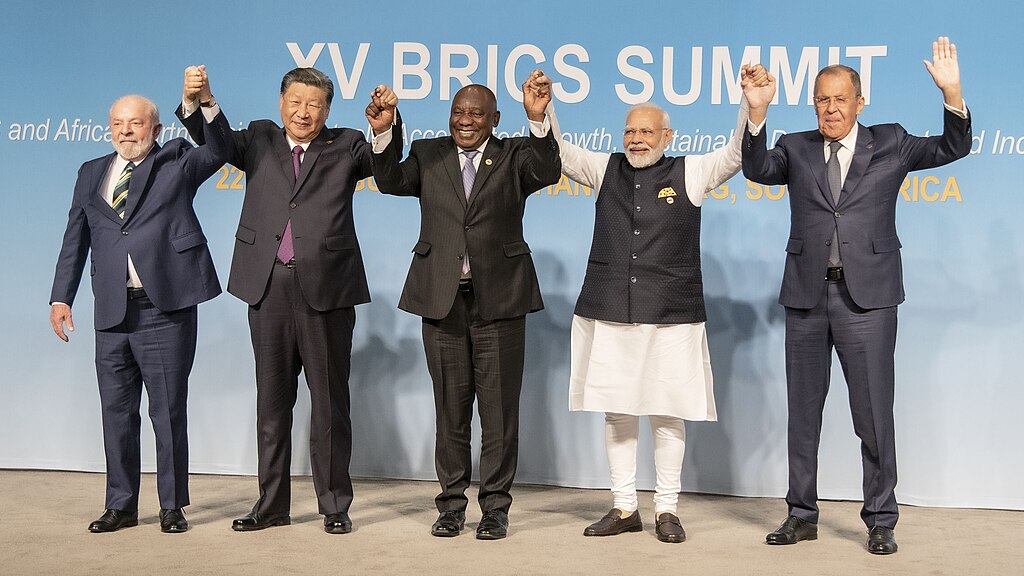BRICS (Brazil, Russia, India, China, and South Africa) is a term first coined by economist Jim O’Neill in 2001 and later adopted into the lingua franca of economists and recognized by the included countries themselves. The organization is comprised of some of the world’s largest emerging economies, and over time, this initially informal grouping of countries has turned into one of the largest international organizations. Its size is in contention with Western-dominated global institutions such as the IMF (International Monetary Fund) and the World Bank. The mission of BRICS has been interpreted differently by many. This is in part because of the lack of ideological cohesion between the BRICS nations. They have different political systems, economies, and geopolitical positions. That said, BRICS’s primary mission has often been to promote dialogue and cooperation between partnering nations and to create greater economic and geopolitical integration among member states.
How do the BRICS nations intend to challenge the hegemony of Western-led global financial institutions? They started by creating the New Development Bank (NDB) in 2015, chartering the bank with the goal of funding infrastructure development in member countries despite similar mandates for the World Bank and IMF. Though appearing almost identical on the surface, the NDB focuses only on infrastructure/development projects, in stark contrast to the IMF and World Bank, which have a wider scope whilst also including infrastructure and financial systems. Today, the NDB has reported that it has funded over 32.8 billion USD in approved projects and built, rebuilt, or upgraded 17,000 km of roads in member or affiliated countries. A core theme in much of the advertising associated with BRICS joint projects is the idea of providing resources to emerging markets and developing countries. The NDB is made specifically to provide monetary aid to fund sustainable and developmental projects in developing countries that are members of BRICS.
Along with the NDB, an overarching goal of BRICS is the de-dollarization of many of the member countries and countries influenced by BRICS. The member countries of BRICS collectively represent almost 40% of the global population. Yet, many of their developing economies remain heavily influenced by the U.S. dollar, constituting approximately 58% of global foreign reserve holdings. This reliance on the U.S. dollar subjects these nations to economic pressures, such as vulnerability to sanctions and currency volatility, in addition to economic subservience to the U.S. For example, sanctions on Russia and Iran have restricted their access to the global economy, showcasing how dependence on the dollar can worsen economic challenges. De-dollarization efforts among BRICS countries aim to reduce such risks, enhancing member states’ financial sovereignty and economic stability.
The 2024 BRICS summit, held in Kazan, Russia, over a two-day period starting on October 22nd, covered many topics, such as global warming and peace agreements. It was also the first summit between nations outside of NATO to discuss pressing geopolitical topics such as the war in Ukraine. The dialogue about the war itself attracted many global leaders, such as Chinese President Xi Jinping, Indian Prime Minister Narendra Modi, and 20 other leaders, including Turkey’s Recep Tayyip Erdogan. At the meeting, U.N. Secretary-General Antonio Guterres, alongside President Xi and PM Modi, also announced a deal that would resolve the four-year military stand-off on the Himalayan frontier. This resolution has been analyzed differently by both Indian and Chinese media. India and China both valued the “border before the broader” mentality, with India reinforcing border peace as a prerequisite for broader ties in general. Conversely, China views this mentality as specific disagreements (border disputes) that should not impact and derail the broader relationship between the two nations. The dispute resolution and the perspectives that came after showcase two major things within BRICS. Firstly, BRICS has the ability to solve disputes between partnering nations. Secondly, it shows that even though BRICS is an organization of countries with similar goals, there is still an ”every-man-for-himself” mentality within negotiations between BRICS nations. Something not typically seen in interactions between NATO or Western-influenced countries. Furthermore, Russian President Vladimir Putin claimed that over 30 countries have expressed a desire to join BRICS, demonstrating the growing recognition of BRICS as a platform for global dialogue.
Looking towards the future, the BRICS group aims to solidify its role in reshaping global financial demographics and pushing back against Western-led geopolitical structures. The growing desire from developing nations for deeper collaboration among emerging economies is set to oppose the dominance of Western-led financial and developmental frameworks. This is despite the fact that BRICS countries have been influenced in some way or another by Western organizations under the liberal rules-based international order. The BRICS’ anti-Western stance is based on a plethora of historical events, including Cold War power imbalances and economic dependency shaped by Western-dominated institutions like the IMF and World Bank. Together, the BRICS stance reflects the broader desire to challenge the hegemony of the West, to stray away from reliance on currency such as the U.S. dollar, and to construct a stage for international diplomacy that emphasizes sovereign equality and mutual respect.
Edited by Bill Lin
This is an article written by a Staff Writer. Catalyst is a student-led platform that fosters engagement with global issues from a learning perspective. The opinions expressed above do not necessarily reflect the views of the publication.
4th Year McGill student pursuing an East Asian Studies major with a minor in Communications.

